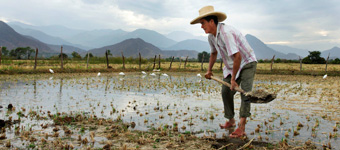Initiatives to Reactivate the Regional Economy Should Include Measures Against Climate Change

Latin America and the Caribbean is one of the regions most vulnerable to climate change, and for this reason, ECLAC has recommended that countries adopt measures to address this phenomenon and avoid its serious consequences, particularly in developing island nations.
The region is located on a hurricane route, has many low coastal zones, depends on the thawing of Andean snow for the provision of water for urban consumption and agriculture, and is vulnerable to floodings and forest fires, among other natural disasters.
ECLAC Executive Secretary Alicia Bárcena has expressed concern that the financial and climate crises continue to be regarded as separate phenomena in the region, with measures and teams of professionals acting separately.
In seminars and documents, the Commission has called on governments to design measures to reactivate their economies but also reduce their vulnerability to climate change and/or the trace of carbon of Latin American economies.
Adaptation and mitigation policies should be part of other development policies, and competition should be based on the best environmental foundations, while protecting the economy.
With this goal and in the aim of providing authorities in the region with elements that may contribute to an analysis of the relationship between climate change and development, ECLAC prepared the document Climate Change and Development in Latin America and the Caribbean. An overview. The document links climate change with issues such as international trade, the negative impact on public finances and future restrictions to economic development based on high carbon consumption.
ECLAC believes that 2009 is a crucial year for negotiations to renew international commitments for reducing greenhouse gas emmissions in light of the XV United Nations Climate Change Conference to take place in Copenhagen in December.
Regional studies
ECLAC and the ministries of environment and finance of Latin America and the Caribbean are working together to achieve preliminary results of how climate change will impact on productive sectors of each country. This is the main goal of the Regional Studies on the Economics of Climate Change (RECC) that ECLAC is preparing in conjunction with countries in the region for the Copenhagen conference.
These studies are being carried out in the subregions of Central America, the Caribbean and South America. “We hope that with these results, climate change will no longer be considered merely an environmental issue, but also an economic one. The objective is that decision-makers consider the effects of climate change on their economies when planning policies and projects,” explains Joseluis Samaniego, Director of the Division of Sustainable Development and Human Settlements and Coordinator of the RECCs at ECLAC.
Data is being collected for the RECCs in almost every country in the region.“The methodology is adapted to the reality of each country, but it must provide results that are comparable among countries and at a regional level. ECLAC’s role is to provide technical assistance to national teams,” he said. Samaniego noted that revealing the economic effects on certain productive sectors will also allow countries to dimension the social impact of climate change.
For more information, see the ECLAC website.

Message of ECLAC Executive Secretary Alicia Bárcena (in Spanish)
See written opinion column (in English)









